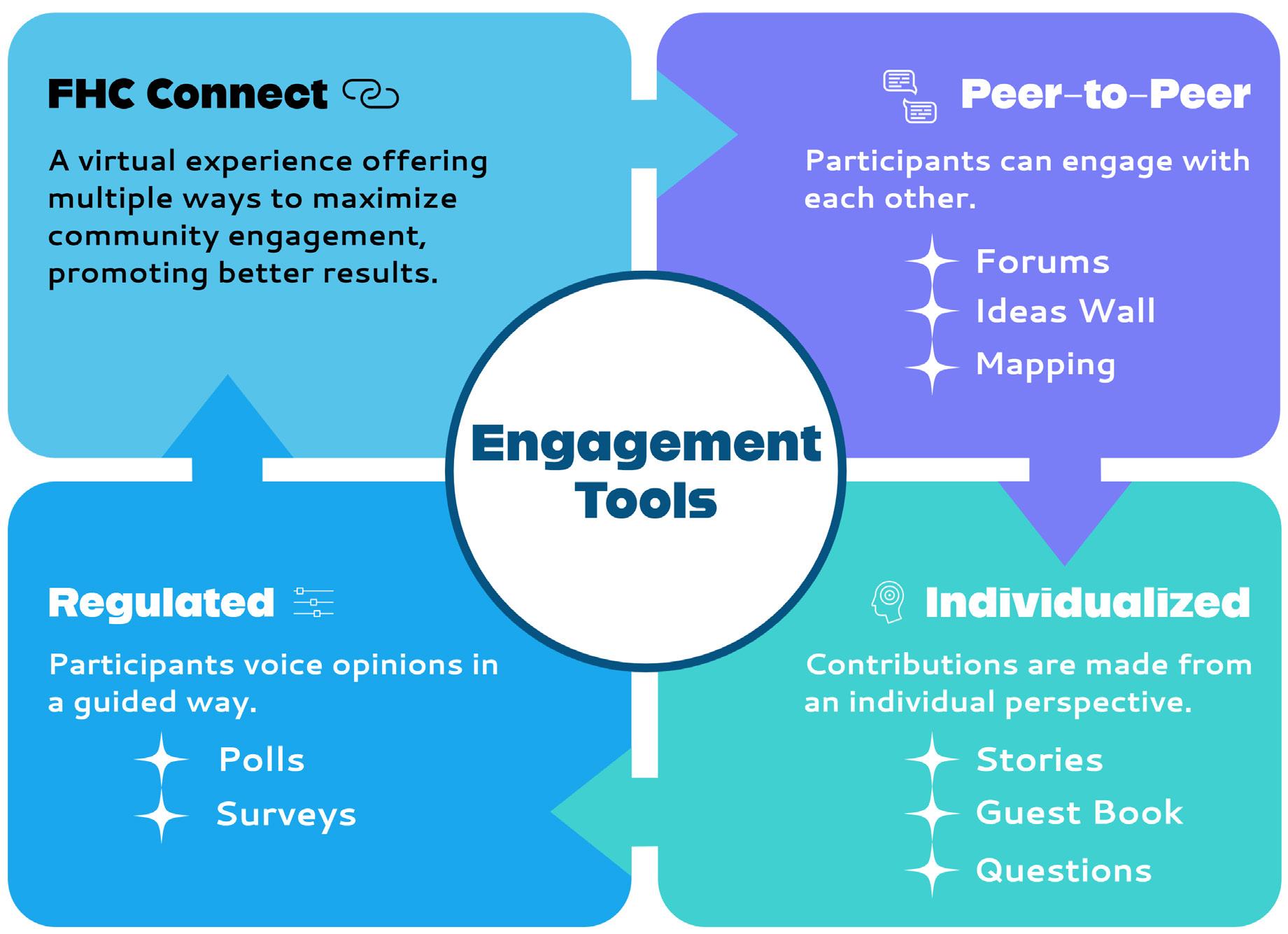
4 minute read
FHC Connect uses digital tools to maximize the benefits of community engagement
WISNERSON (WIS) BENOIT AND CARTER BURTON
Community engagement can result in better policy creation, program implementation, and resource allocation activities. While the default of “two public meetings and a notice in a local newspaper” may meet minimum requirements, it only scratches the surface of what’s possible. More consequently, it can leave essential issues unaddressed. This is why, in a commitment to intentional planning, the Coalition has launched FHC Connect, our virtual community engagement platform offering multiple ways to engage in one place to build better connections between the public and private sector for large planning frameworks or project-specific activities.
Advertisement
Community Engagement as an Equity Lens Good public participation and engagement processes give us access to valuable qualitative data that adds important context to quantitative data. This additional context crucially provides an equity lens in community development practice. While it may seem neutral, quantitative data can harbor detrimental biases that may not be revealed without deeper community engagement. Historically, exclusion in community development practice has been a vehicle for structural placebased harm.
Improved public participation can bring underrepresented voices into the conversation and shed light on blind spots. For instance, in the practice of ending homelessness, the most widely used assessment tool for households experiencing homelessness, the Vulnerability Index-Services Prioritization Decision Assistance Tool (VI-SPDAT), has recently come under scrutiny after studies indicated racial bias. Without the engagement of service providers and their clients to understand how these discrepancies show up, these populations may continue to be overlooked or disregarded. It is through qualitative data from the people most impacted
by public policies that we can derive meaning and better understand factors best captured by the lived experience.
Strengthening Implementation Impact Developing stronger community engagement processes is essential for responding to the ever-changing environments, needs, and underlying issues in the field of housing. Neighborhoods with long histories and complex networks must be understood before interventions are put into place. Targeted engagement can serve to involve those who have not traditionally engaged in planning processes. Allowing longtime community members to share their priorities and needs in multiple ways can result in a stronger and more equitable process that is essential to implementation outcomes. Not only does this strengthen the strategy by creating a better understanding between the local government and community members, but it also increases the capacity for community members to engage in the co-creation of solutions.
In our work, the Florida Housing Coalition has seen time and again that pairing expert technical assistance and local knowledge is a winning solution that unlocks dormant opportunities and creates partnerships that expedite grassroots work. Currently, we are using FHC Connect to enhance communication and operate as a collaboration center in our Closing the Racial Gap in Homeownership project by capturing stories, perspectives, and insights that may have been otherwise missed throughout the course of working with our partner communities.
The Participation-Inclusion Nexus Quick and Feldman write in their paper “Distinguishing Participation and Inclusion” that “enhancing participatory practices enriches the input received, while enhancing inclusive practices builds the capacity of the community to implement the decisions and tackle related issues.” Participation practices aim at increasing input and are essential to good data gathering; however, there should be as much
Wisnerson (Wis) Benoit is a Technical Advisor with the Florida Housing Coalition. Wis previously served as a Planning Analyst at the Florida Department of Economic Opportunity. Wis is an FSU graduate with Master’s Degree in City/ Urban Community and Regional Planning and formerly served as a Mayoral Fellow with the City of Tallahassee’s Office of the Mayor. of an intent to engage in ways that deepen inclusion and connection and contribute to an ongoing community forum where the public co-produces solutions among people, across issues, and over time.
Creating an expansive and ongoing framework for interaction may not be accessible or even appropriate for every process, and strategies will vary across a participation-inclusion matrix. Nonetheless, being able to apply efforts along both dimensions can contribute to a process that makes more impact and contributes to the ongoing effort of building trust, enhancing communication, and implementing solutions.
The Digital Platform FHC Connect supports and strengthens citizen participation in the communities we work with and elevates the community engagement experience to be convenient and highly impactful.
Community engagement has evolved with the pandemic, and adding an online presence to engagement efforts is a necessary layer to support broader participation and deeper inclusion.
FHC Connect provides our communities with a dedicated project site to collect qualitative data from stakeholders. Featuring engagement tools such as a story board, discussion forums, ideas wall, surveys, and polls, FHC Connect helps communities comply with state and federal citizen participation requirements while supporting accessibility and inclusion.
Working with Communication Departments to ensure compliance with branding requirements, the Coalition quickly builds out project sites and launches community engagement efforts. Sites are custom designed within our platform template, allowing our communities to choose how they engage. This user-friendly platform builds stronger communities and supports better outcomes through meaningful engagement.
Carter Burton is the Director of Housing and Community Development and a Technical Advisor with the Florida Housing Coalition. Carter’s expertise is in HUD housing and community development programs, including CDBG, HOME, and ESG, and developing Consolidated Plans, Annual Action Plans, Analysis of Impediments to Fair Housing, and related performance and evaluation reports.








